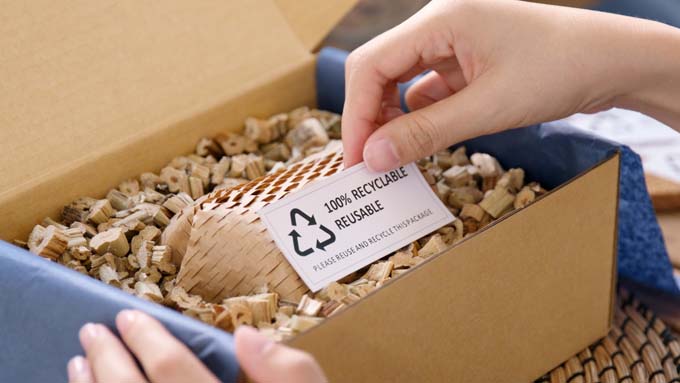Sustainability in e-commerce: What adjustments can and must companies make?
CO2 guzzler, climate-damaging and anything but sustainable - logistics in particular is the Achilles' heel of e-commerce. A fact that applies not only to online retail in Switzerland, but also to all neighboring countries. What more can e-commerce do in terms of sustainability?

Switzerland is affected by the consequences of climate change in several ways. The warming of the climate by 2°C already - according to the FOEN - causes glaciers to melt. As a result, slopes are becoming increasingly unstable, with the threat of debris flows, rockfalls, etc. At the same time, drought threatens to become a problem due to declining precipitation - also or especially in winter. Against the backdrop of such scenarios, it is clear that sustainability is also a key issue for the Swiss E-Commerce-companies is moving further up the agenda. Also because consumers are increasingly making decisions based on ecological aspects. What can Swiss companies do?
How important is sustainability for e-commerce companies in Switzerland?
Online retailers have had to solve a whole range of very different problems in recent months. Rising prices - especially in the international environment - and difficulties in the supply chains are just two very important points. It is clear that aspects such as:
- Growth
- Automation and optimization
- Presence in the marketplace
play a major role. Where does sustainability have its place? A survey by the Lucerne University concludes that precisely the three points just mentioned are particularly important for companies in e-commerce - and in descending order.
Sustainability lies somewhere in the middle. What is surprising at this point is that the impact of Corona does not seem to have such a big influence. At least this topic is still behind sustainability. In other words, the topic is not quite so unimportant after all. It is interesting to see from which perspective companies from the Swiss e-commerce scene view the topic.
In addition to the fact that sustainability is seen by the vast majority as a corporate responsibility, more than half of the companies also see it as an important competitive factor. The surprise is the view of the impact of legislative requirements. This point is only an important factor influencing sustainability for just under a quarter of the companies surveyed. The fact is: Sustainability is not an absolute priority for many companies in the mail order business, but it is not simply swept under the rug either.
Where can companies start?
In principle, there are various levers that every company can turn. Among other things, sustainability takes effect in the areas of:
- Packing
- Shipping
- Storage
But: Administration also leaves enough room for sustainability to be taken into account. Simple examples include the use of efficient IT hardware or office equipment made from recycled wood or certified wood sources.
1. sustainability in packaging
Every consumer knows this moment: The parcel carrier rings and presses the eagerly awaited box into the hand. Its dimensions are often a surprise. The product is the size of a shoebox, but is delivered in a package that is twice to three times as big. To prevent the contents from shifting, the whole thing is stuffed with cardboard or plastic film.
And the packaging madness continues. Today, products are still packed in a shiny cardboard box with a sturdy transparent box. Looks really great on the shelf - but nobody cares when it comes to shipping. Here However, there are many other possibilities. Many electrical products are also packaged in vast quantities of Styrofoam. There is certainly still potential to be tapped here in terms of packaging materials.
When it comes to packaging, e-commerce in Switzerland simply has a lot of catching up to do. Precisely fitting cardboard packaging avoids additional packaging waste. In many cases, the "outer packaging" could even be dispensed with completely. A shipping label is all that is needed for shock-proof packaging ex works. Many consumers certainly have no problem with this. And where they do, a low packaging/shipping fee can certainly create incentives. In the end, less waste simply means more sustainability, which thus also arrives at home.
2. sustainability in shipping
Shipping and packaging are interrelated to a certain extent. In the broadest sense, shipping packaging can be attributed to shipping. It doesn't always have to be petroleum-based plastic. Biochemistry has meanwhile come up with alternatives with similar properties.
At this point, however, sustainability also means rethinking filling materials and, above all, communication. Customers always notice that goods are suddenly shipped in different packaging. Companies in e-commerce would do well to strive for clear and unambiguous communication.
Treated paper for labels is a major problem in the mail order business. If they cannot be disposed of in paper waste, sustainability quickly looks bad. But: Grass paper and wood foil are alternatives that are always available.
But sustainability can also play a role in the actual transport process. Electromobility or emissions offsetting are very popular with a growing number of consumers - and are ultimately rewarded with a high level of customer loyalty.
One extremely important point is the subject of returns. Huge numbers of shipments are still being returned. According to media reports, Switzerland is the Returns European champion.
Sustainability is also becoming increasingly important for customers
What does it all cost? Not a trivial question for companies. On the contrary, every euro on the expenditure side is a burden. So do you want to turn the clock back to cheap? In any case, this is the wrong way to go. Also because in recent years, more and more customers are making sustainability the basis for their decisions.
People prefer to buy where sustainability is actively practiced. A realization that puts the individual measures in a completely different light. No e-commerce company can afford to simply sweep the issue under the carpet.

Conclusion: Sustainability in e-commerce is the future
Twenty years ago, hardly anyone was interested in sustainability and it was perceived more as a marginal phenomenon that has evolved over the years. Especially against the backdrop of climate change, more customers are paying attention to sustainable aspects. The thoughtless use of resources is over - even in e-commerce. The mail order business in particular simply has to rethink here. It can't just be about smaller packaging. In some places, processes need to be completely rethought.









